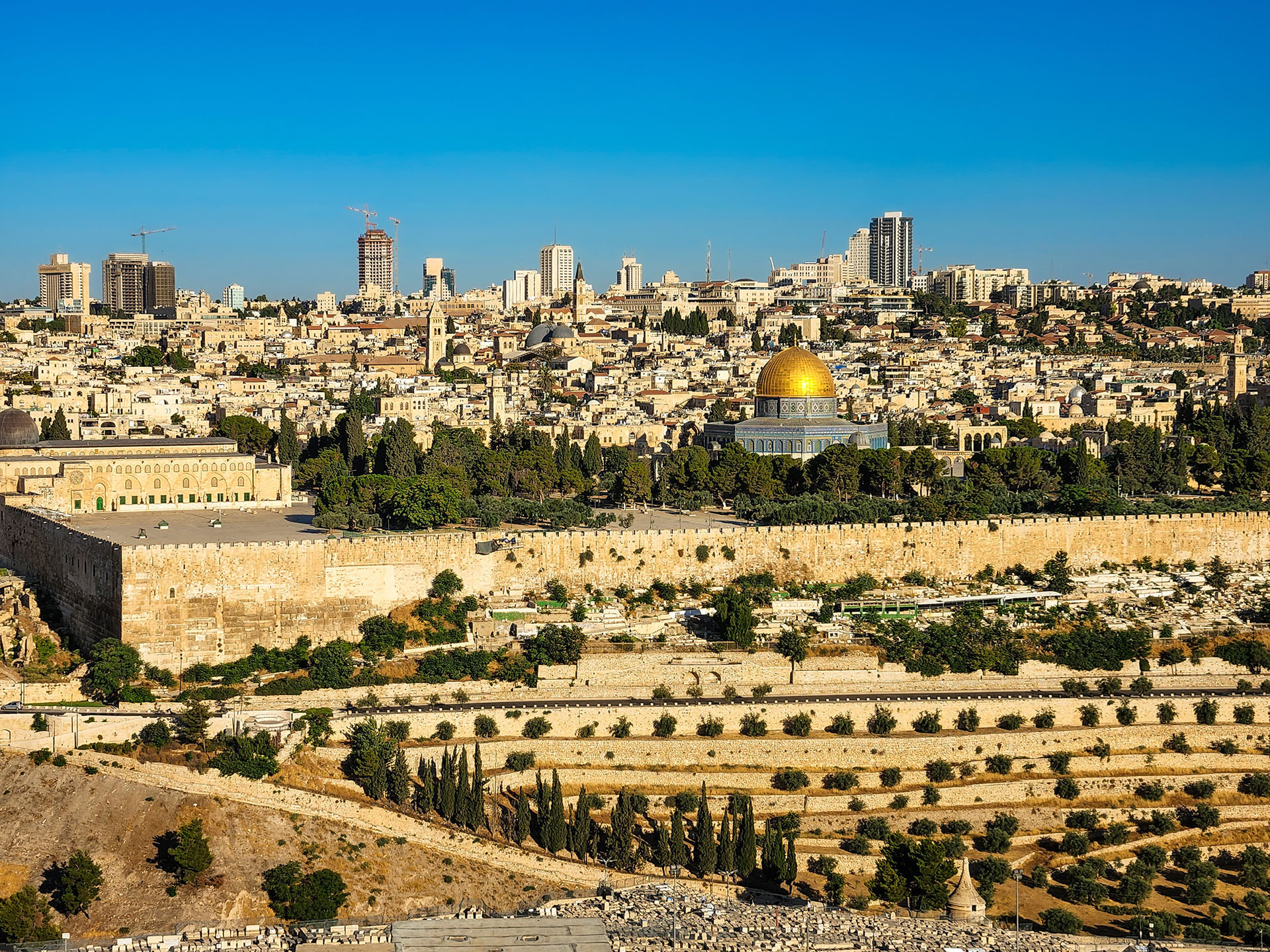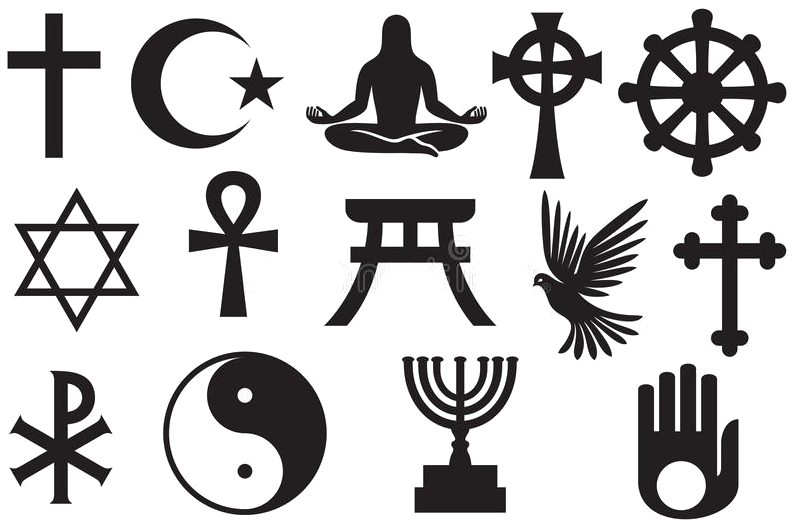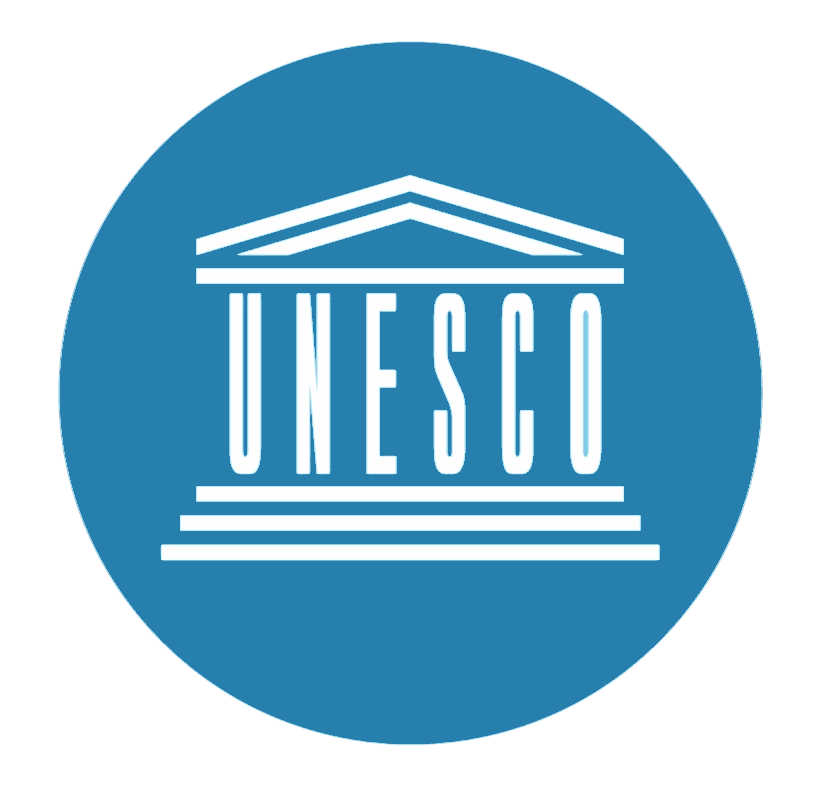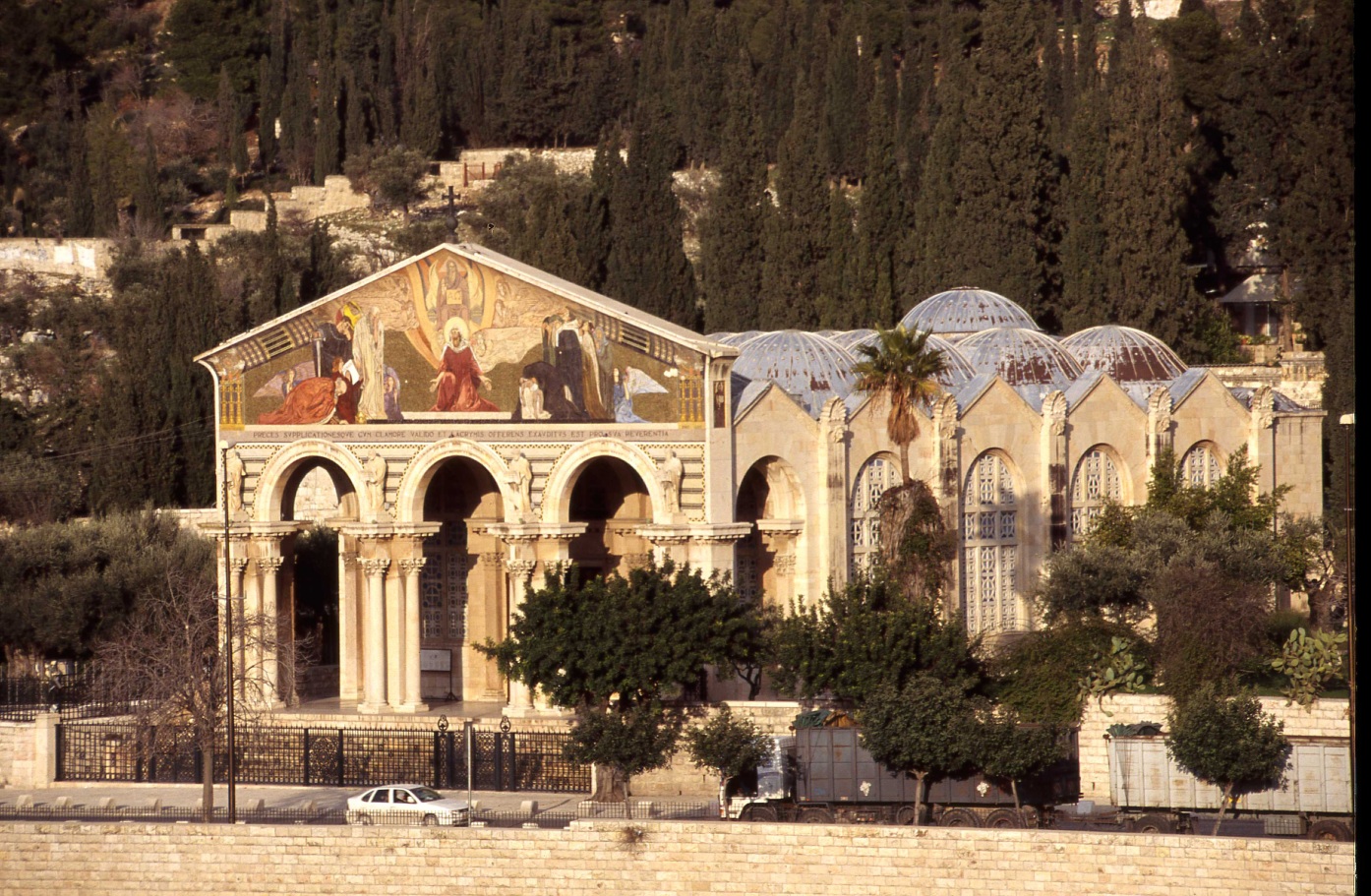

耶路撒冷市 (Jerusalem) 位于巴勒斯坦中部犹地亚山的四座山丘上,是一座举世闻名的历史古城,距今已有5000多年的历史。四周群山环抱,面积158平方公里,由东部旧城和西部新城组成。海拔835米,63.4万(2000年),是以色列最大城市。
耶路撒冷旧城是一座宗教圣城,是犹太教、伊斯兰教和基督教世界三大宗教发源地,三教都把耶路撒冷视为自己的圣地。宗教和传统、历史和神学以及神圣的处所和祈祷的房屋,使耶路撒冷成为备受犹太教徒、基督教徒和穆斯林崇敬的神圣城市。 耶路撒冷所在地最早叫“耶布斯”,这是因为很早以前阿拉伯迦南人的一个名叫“耶布斯”的部落从阿拉伯半岛迁徙到这里定居下来,修建村庄,构筑城堡,并以部 落的名字命名此地。后来,迦南人又在这里修建城市,并定名为“尤罗萨利姆”。大约在公元前一千年左右,犹太王国创始人大卫征服了这个地方,将它作为犹太王 国的都城,继续沿用“尤罗萨利姆”的名称,为使它希伯莱化,称为“尤罗萨拉姆”。 中文以此译为“耶路撒冷”,意为“和平之城”。阿拉伯人称该城为“古德斯”,即“圣城”。 (Quelle: www.mjjq.com/)
耶路撒冷(希伯来语: יְרוּשָׁלַיִם,拉丁化:Yerushaláyim;阿拉伯语:
יְרוּשָׁלַיִם,拉丁化:Yerushaláyim;阿拉伯语: القُدس,拉丁化:al-Quds,汉译:古都斯或古德斯,意为“神圣的”;唐朝时期的景教徒曾根据叙利亚语“Ūrišlem”译作乌梨师敛[2][3])为以色列和巴勒斯坦境内的一座城市,位于地中海和死海之间,是古代巴勒斯坦中部的全球宗教重镇,也是完整保留人类信仰文明演进史的一个历史城市。耶路撒冷同时是犹太教、基督教和伊斯兰教三大亚伯拉罕宗教(或称“三大天启宗教”)的圣地。自公元前10世纪,所罗门王建成第一圣殿起,耶路撒冷一直是犹太教信仰的中心和最神圣的城市[4],昔日圣殿的遗迹西墙,仍是犹太教最神圣的所在。基督徒也相当重视耶路撒冷,因为根据《圣经》记载,耶稣在这里受难、埋葬、复活、升天。伊斯兰教亦将耶路撒冷列为麦加、麦地那之后的第三圣地,以纪念穆罕默德的夜行登霄[5],并在圣殿山上建造2座清真寺——阿克萨清真寺和圆顶清真寺来纪念这一事件。
القُدس,拉丁化:al-Quds,汉译:古都斯或古德斯,意为“神圣的”;唐朝时期的景教徒曾根据叙利亚语“Ūrišlem”译作乌梨师敛[2][3])为以色列和巴勒斯坦境内的一座城市,位于地中海和死海之间,是古代巴勒斯坦中部的全球宗教重镇,也是完整保留人类信仰文明演进史的一个历史城市。耶路撒冷同时是犹太教、基督教和伊斯兰教三大亚伯拉罕宗教(或称“三大天启宗教”)的圣地。自公元前10世纪,所罗门王建成第一圣殿起,耶路撒冷一直是犹太教信仰的中心和最神圣的城市[4],昔日圣殿的遗迹西墙,仍是犹太教最神圣的所在。基督徒也相当重视耶路撒冷,因为根据《圣经》记载,耶稣在这里受难、埋葬、复活、升天。伊斯兰教亦将耶路撒冷列为麦加、麦地那之后的第三圣地,以纪念穆罕默德的夜行登霄[5],并在圣殿山上建造2座清真寺——阿克萨清真寺和圆顶清真寺来纪念这一事件。
自1967年第三次中东战争之后,以色列控制了全部的耶路撒冷地区,包括西耶路撒冷和东耶路撒冷,以及老城区。以色列和巴勒斯坦都声称耶路撒冷是他们的首都,因为以色列坚称这里是他们主要的政府机构,而巴勒斯坦则称预见这座城市是他们的政权所在地。不过,这两个声称在国际社会上都没有得到广泛的承认,认为该市的最终地位尚未确定,有待以色列和巴勒斯坦双方谈判决定。多数国家都将大使馆设在特拉维夫[6][7]。今天耶路撒冷仍然是以巴冲突的中心。以色列现行政区划上设耶路撒冷区,面积652平方公里,只有一个分区,即耶路撒冷分区。
2006年,耶路撒冷市区面积为126平方公里,人口约724,000人,这两项指标均居以色列和巴勒斯坦各城市之首[8][9][10]。
今天的耶路撒冷,是一个对比强烈的城市,不同文化、不同宗教、不同民族、社会不同阶层,同处一城;城市的东西两部分截然不同,发展水平悬殊。老城雅法门以西的西耶路撒冷(1967年以前属于以色列的市区)是现代以色列的核心地带(如果再继续向西数十公里,就是以特拉维夫为中心的“古什·但”区域),而老城及其东、北、南三面的东耶路撒冷(1967年后以色列占领的争议区域)则以巴勒斯坦人为主。最特别的地方是面积只有1平方公里,被一圈城墙所围绕的耶路撒冷老城[11],其中又分为4个宗教与种族聚居区:犹太区、基督徒区、亚美尼亚区和穆斯林区。耶路撒冷最重要的也引起重大争议的宗教圣地,均位于此处:犹太教的西墙和圣殿山、穆斯林的圆顶清真寺和阿克萨清真寺,以及基督徒的圣墓教堂和苦路。
Jerusalem (hebräisch  ירושלים?/i, Jeruschalajim [jeʁuʃa'lajim]; arabisch القدس al-Quds ‚die Heilige‘; altgriechisch Ἱεροσόλυμα Hierosólyma [n. pl.], oder Ἰερουσαλήμ Ierousalḗm [f., indecl.]; lateinisch Hierosolyma [n. pl. oder f. sg.], Hierosolymae [f. pl.], Hierusalem oder Jerusalem [n., indecl.]) ist eine Stadt in den judäischen Bergen zwischen Mittelmeer und Totem Meer mit rund 882.000 Einwohnern.
ירושלים?/i, Jeruschalajim [jeʁuʃa'lajim]; arabisch القدس al-Quds ‚die Heilige‘; altgriechisch Ἱεροσόλυμα Hierosólyma [n. pl.], oder Ἰερουσαλήμ Ierousalḗm [f., indecl.]; lateinisch Hierosolyma [n. pl. oder f. sg.], Hierosolymae [f. pl.], Hierusalem oder Jerusalem [n., indecl.]) ist eine Stadt in den judäischen Bergen zwischen Mittelmeer und Totem Meer mit rund 882.000 Einwohnern.
In Jerusalem begegnen sich viele Kulturen der Antike und Moderne. Die Altstadt ist in das muslimische, jüdische, christliche und armenische Viertel gegliedert und von einer Mauer umgeben.
Der politische Status der Stadt ist international umstritten und Teil des Nahostkonflikts. Jerusalem wurde von Israel, das das gesamte Stadtgebiet kontrolliert, als seine Hauptstadt deklariert. Der Staat Palästina beansprucht Ost-Jerusalem als seine Hauptstadt. In Jerusalem befinden sich der Sitz des Staatspräsidenten, die Knesset und das Oberste Gericht als Teil des politischen Systems Israels, die 1918 gegründete Hebräische Universität sowie die Holocaustgedenkstätte Yad Vashem und der Israel National Cemetery. Ostjerusalem, das bedeutende religiöse Stätten des Judentums, Christentums und des Islam beherbergt, wird von gemäßigteren Palästinenser-Organisationen jedoch als Hauptstadt eines zukünftigen palästinensischen Staates beansprucht, während radikalere Palästinenser-Organisationen die gesamte Stadt als Hauptstadt fordern.
エルサレムまたはイェルサレムは、イスラエルおよびパレスチナ自治区にある都市。
イスラエルはエルサレムが自国の「首都」であると宣言しているものの、国際連合など国際社会はこれを認めておらず[1][2]、イスラエルの首都はテルアビブであるとみなし[1][2]ている。したがって、イスラエルと国交を持つ諸国も、大使館や領事館はエルサレムでなくテルアビブに置いてきた。ただし、2017年になってアメリカ合衆国のドナルド・トランプ大統領はエルサレムをイスラエルの首都であると明言[1][2]。2018年5月、アメリカ大使館をテルアビブからエルサレムに移転させた[3]。
Jerusalem (/dʒəˈruːsələm/; Hebrew: יְרוּשָׁלַיִם  Yerushaláyim; Arabic: القُدس
Yerushaláyim; Arabic: القُدس  al-Quds)[note 2] is a city in the Middle East, located on a plateau in the Judaean Mountains between the Mediterranean and the Dead Sea. It is one of the oldest cities in the world, and is considered holy to the three major Abrahamic religions—Judaism, Christianity, and Islam. Both Israel and the Palestinian Authority claim Jerusalem as their capital, as Israel maintains its primary governmental institutions there and the State of Palestine ultimately foresees it as its seat of power; however, neither claim is widely recognized internationally.[note 3][8]
al-Quds)[note 2] is a city in the Middle East, located on a plateau in the Judaean Mountains between the Mediterranean and the Dead Sea. It is one of the oldest cities in the world, and is considered holy to the three major Abrahamic religions—Judaism, Christianity, and Islam. Both Israel and the Palestinian Authority claim Jerusalem as their capital, as Israel maintains its primary governmental institutions there and the State of Palestine ultimately foresees it as its seat of power; however, neither claim is widely recognized internationally.[note 3][8]
During its long history, Jerusalem has been destroyed at least twice, besieged 23 times, attacked 52 times, and captured and recaptured 44 times.[9] The part of Jerusalem called the City of David was settled in the 4th millennium BCE.[10] Jerusalem was named as "Urusalim" on ancient Egyptian tablets, probably meaning "City of Shalem" after a Canaanite deity, during the Canaanite period (14th century BCE). During the Israelite period, significant construction activity in Jerusalem began in the 9th century BCE (Iron Age II), and in the 8th century the city developed into the religious and administrative center of the Kingdom of Judah.[11] In 1538, the city walls were rebuilt for a last time around Jerusalem under Suleiman the Magnificent. Today those walls define the Old City, which has been traditionally divided into four quarters—known since the early 19th century as the Armenian, Christian, Jewish, and Muslim Quarters.[12] The Old City became a World Heritage Site in 1981, and is on the List of World Heritage in Danger.[13] Since 1860 Jerusalem has grown far beyond the Old City's boundaries. In 2015, Jerusalem had a population of some 850,000 residents, comprising approximately 200,000 secular Jewish Israelis, 350,000 Haredi Jews and 300,000 Palestinians.[14][note 4] In 2011, the population numbered 801,000, of which Jews comprised 497,000 (62%), Muslims 281,000 (35%), Christians 14,000 (around 2%) and 9,000 (1%) were not classified by religion.[16]
According to the Bible, King David conquered the city from the Jebusites and established it as the capital of the united kingdom of Israel, and his son, King Solomon, commissioned the building of the First Temple.[note 5] These foundational events, straddling the dawn of the 1st millennium BCE, assumed central symbolic importance for the Jewish people.[18][19] The sobriquet of holy city (עיר הקודש, transliterated ‘ir haqodesh) was probably attached to Jerusalem in post-exilic times.[20][21][22] The holiness of Jerusalem in Christianity, conserved in the Septuagint[23] which Christians adopted as their own authority,[24] was reinforced by the New Testament account of Jesus's crucifixion there. In Sunni Islam, Jerusalem is the third-holiest city, after Mecca and Medina.[25][26] In Islamic tradition, in 610 CE it became the first qibla, the focal point for Muslim prayer (salat),[27] and Muhammad made his Night Journey there ten years later, ascending to heaven where he speaks to God, according to the Quran.[28][29] As a result, despite having an area of only 0.9 square kilometres (0.35 sq mi),[30] the Old City is home to many sites of seminal religious importance, among them the Temple Mount with its Western Wall, Dome of the Rock and al-Aqsa Mosque, and the Church of the Holy Sepulchre. Outside the Old City stands the Garden Tomb.
Today, the status of Jerusalem remains one of the core issues in the Israeli–Palestinian conflict. During the 1948 Arab–Israeli War, West Jerusalem was among the areas captured and later annexed by Israel while East Jerusalem, including the Old City, was captured and later annexed by Jordan. Israel captured East Jerusalem from Jordan during the 1967 Six-Day War and subsequently annexed it into Jerusalem, together with additional surrounding territory.[note 6] One of Israel's Basic Laws, the 1980 Jerusalem Law, refers to Jerusalem as the country's undivided capital. All branches of the Israeli government are located in Jerusalem, including the Knesset (Israel's parliament), the residences of the Prime Minister (Beit Aghion) and President (Beit HaNassi), and the Supreme Court. While the international community rejected the annexation as illegal and treats East Jerusalem as Palestinian territory occupied by Israel,[34][35][36][37] Israel has a stronger claim to sovereignty over West Jerusalem.[38][39]
Jérusalem /ʒe.ʁy.za.lɛm/ (ou Salem, également nommée Hiérosolyme ou Solyme en ancien français ; יְרוּשָׁלַיִם Yerushaláyim en hébreu [dénomination israélienne officielle] ; arabe : القدس al Quds ou اورشليم Ûrshalîm [dénomination israélienne officielle en arabe]) est une ville du Proche-Orient que les Israéliens ont érigée en capitale, que les Palestiniens souhaiteraient comme capitale et qui tient une place centrale dans les religions juive, chrétienne et musulmane.
La ville s’étend sur 126 km2 pour une population de 901 300 habitants en 20171. La ville, chef-lieu du district de Jérusalem, est cosmopolite : s'y mêlent de nombreuses religions, peuples, groupes socio-économiques. La partie nommée vieille ville, entourée de remparts, est constituée de deux quartiers à dominante arabe, dits quartier chrétien et quartier musulman, ainsi que d’un quartier à dominante arménienne et d’un quartier à dominante juive.
Gerusalemme (AFI: /ʤeruzaˈlɛmme/[2][3]; in ebraico: יְרוּשָׁלַיִם?, Yerushalayim, Yerushalaim e/o Yerushalaym ascolta[?·info]; in arabo: القُدس, al-Quds, "la (città) santa"[4], sempre in arabo: أُورْشَلِيم, Ūrshalīm, in greco Ιεροσόλυμα, Ierosólyma, in latino Hierosolyma o Ierusalem, per antonomasia è definita "La Città Eterna"[5]), capitale giudaica tra il X e il VI secolo a.C.[6], è la capitale contesa di Israele e città santa nell'Ebraismo, nel Cristianesimo e nell'Islam. Si trova sull'altopiano che separa la costa orientale del Mar Mediterraneo dal Mar Morto, a est di Tel Aviv, a sud di Ramallah, a ovest di Gerico e a nord di Betlemme.
La Città Vecchia e le sue mura, considerate patrimonio dell'umanità dall'UNESCO, racchiudono in meno di un chilometro quadrato molti luoghi di grande significato religioso come il Monte del Tempio, il Muro del pianto, la Basilica del Santo Sepolcro, la Cupola della Roccia e la Moschea al-Aqsa. Nel corso della sua storia Gerusalemme è stata distrutta e ricostruita due volte ed è stata assediata, conquistata e riconquistata in decine di occasioni.
La parte orientale di Gerusalemme è stata occupata[7] dallo Stato di Israele nel 1967, e nel 1980 il parlamento israeliano approvò una legge fondamentale (l'equivalente di un emendamento costituzionale) che proclamava unilateralmente "Gerusalemme, unita e indivisa [...]".[8] Il Consiglio di sicurezza delle Nazioni Unite nella risoluzione 478 ha definito la legge nulla e priva di validità[9], una violazione del diritto internazionale[10] e un serio ostacolo al raggiungimento della pace in Medio Oriente[11][12].
Jerusalén (en hebreo, יְרוּשָׁלַיִם  Yerushaláyim (?·i); en árabe, القـُدْس
Yerushaláyim (?·i); en árabe, القـُدْس  al-Quds (?·i)) es la capital de Israel y su ciudad más grande y poblada, con 865 7004 residentes en un área de 125,1 kilómetros cuadrados.2 Los asentamientos más antiguos en Jerusalén son del V milenio a. C. y es una de las ciudades más antiguas del mundo.5 Jerusalén tiene un profundo significado religioso para el cristianismo, el judaísmo y el islam. Geográficamente, se sitúa en los montes de Judea, entre el mar Mediterráneo y la ribera norte del mar Muerto, y se ha extendido bastante más allá de los límites de la Ciudad Vieja.
al-Quds (?·i)) es la capital de Israel y su ciudad más grande y poblada, con 865 7004 residentes en un área de 125,1 kilómetros cuadrados.2 Los asentamientos más antiguos en Jerusalén son del V milenio a. C. y es una de las ciudades más antiguas del mundo.5 Jerusalén tiene un profundo significado religioso para el cristianismo, el judaísmo y el islam. Geográficamente, se sitúa en los montes de Judea, entre el mar Mediterráneo y la ribera norte del mar Muerto, y se ha extendido bastante más allá de los límites de la Ciudad Vieja.
El estatus de la parte oriental de la ciudad, conquistada en 1967 por Israel, se encuentra disputado, ya que en este sector —referido habitualmente como Jerusalén Este o Jerusalén Oriental, que incluye la Ciudad Vieja— es donde el Estado de Palestina pretende establecer su capital. Israel discute las reclamaciones palestinas y, tras la Guerra de los Seis Días, considera la ciudad como un todo unificado y un mismo municipio, declarándola como su capital "eterna e indivisible" mediante la Ley de Jerusalén en 1980. Esta anexión ha provocado un amplio rechazo en la comunidad internacional, materializado en la resolución 478 del Consejo de Seguridad de la ONU, que la consideró contraria al Derecho Internacional,6 y en señal de protesta por este acto unilateral los Estados miembros de las Naciones Unidas acabaron por trasladar sus embajadas a Tel Aviv, tal como pedía la resolución.
Jerusalén fue habitada por los jebuseos antes de la llegada de las tribus hebreas a Canaán a principios del siglo XIII a. C. Históricamente, y según la tradición, fue la antigua capital del Reino de Israel y del Reino de Judá, y siglos más tarde del reino franco de Jerusalén.7
La Ciudad Vieja de Jerusalén fue declarada Patrimonio de la Humanidad por la Unesco en 1981.
Иерусали́м (ивр. יְרוּשָׁלַיִם Йерушала́(й)им (audio) (инф.), араб. القُدس аль-К̣удс[комм. 1], أورشليم Ӯршалӣм (Ӯрушалӣм)[комм. 2], أورشليم القدس, Ӯршалӣм-аль-К̣удс[комм. 3] (audio) (инф.)) — столица Израиля[3][4][5][6][7], город на Ближнем Востоке. Расположен на плато в Иудейских горах на водоразделе между Средиземным и Мёртвым морями, на высоте 650—840 м над уровнем моря; климат средиземноморский, с жарким, сухим летом и мягкой, влажной зимой. Город является священным для трёх крупнейших авраамических религий — иудаизма, христианства и ислама. Населён представителями множества национальных, этнических и религиозных деноминаций; численность населения Иерусалима (без пригородов) составляет 865 721 жителей.
23 января 1950 года Кнессет (Израильский парламент) провозгласил Иерусалим столицей Государства Израиль[8]; с 1967 года в результате Шестидневной войны Израиль стал контролировать всю территорию города: как Западный Иерусалим, так и Восточный. В 1980 году Кнессет провозгласил Иерусалим единой и неделимой столицей Израиля[3][9]. Израильский суверенитет над восточной частью города[10] и статус всего Иерусалима как столицы Израиля не признаны значительной частью международного сообщества[11][12][13], которое относится к Восточному Иерусалиму как к палестинской территории, оккупированной Израилем[14][15][16][17]. Статус Иерусалима остаётся одной из центральных тем палестино-израильского конфликта.
Иерусалим является одним из древнейших городов мира: первые поселения датируются IV тысячелетием до н. э. В XI веке до н. э. город был занят евреями и провозглашён столицей Израильского царства, а с X века до н. э. — Иудейского. После распада Римской империи Иерусалим отошёл к Византии. С этого момента начинается христианизация города. C захватом в 639 году арабским халифом Умаром ибн Хаттабом город начинает приобретать мусульманский облик. В 1099—1187 и 1229—1244 годах Иерусалим был под властью крестоносцев.
В 1538 году при Сулеймане Великолепном вокруг Иерусалима были построены стены. Сегодня эти стены определяют границы Старого города, который традиционно разделяется на четыре квартала, известные с начала XIX века как Армянский, Христианский, Еврейский и Мусульманский кварталы[18]. В 1981 г. Старый город стал объектом Всемирного наследия, и включён в Список всемирного наследия, находящегося под угрозой[19]. Современный Иерусалим разросся далеко за пределы границ Старого города.
Исторически в основе экономики города лежит его привлекательность для паломников и светских туристов. Однако всё большую роль в экономике Иерусалима играют современные высокотехнологичные предприятия; в 2005 году город признан одним из пяти наиболее динамично развивающихся технологических центров планеты. В Иерусалиме также расположены многие художественные и культурные площадки, в том числе всемирно известный Музей Израиля. Город является государственным телерадиовещательным центром страны. Основанный в 1925 г. Еврейский университет в Иерусалиме входит в первые две сотни учебных заведений мира.






 History
History
 Religion
Religion
 World Heritage
World Heritage










